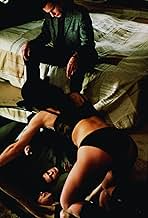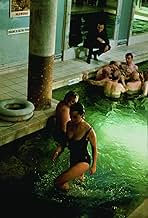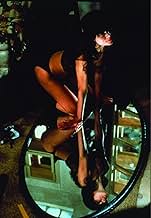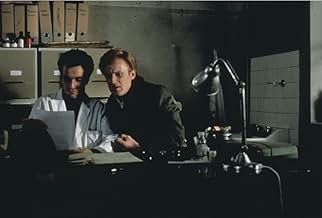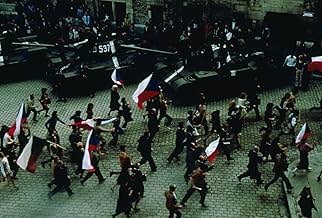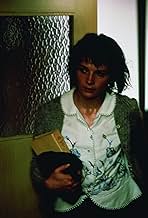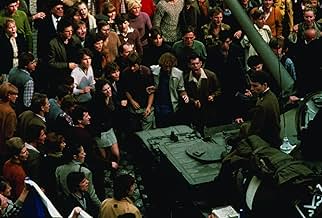L'insostenibile leggerezza dell'essere
Titolo originale: The Unbearable Lightness of Being
Nel 1968, un medico ceco con una vita sessuale attiva incontra una donna che vuole la monogamia, e poi l'invasione sovietica sconvolge ulteriormente le loro vite.Nel 1968, un medico ceco con una vita sessuale attiva incontra una donna che vuole la monogamia, e poi l'invasione sovietica sconvolge ulteriormente le loro vite.Nel 1968, un medico ceco con una vita sessuale attiva incontra una donna che vuole la monogamia, e poi l'invasione sovietica sconvolge ulteriormente le loro vite.
- Regia
- Sceneggiatura
- Star
- Candidato a 2 Oscar
- 7 vittorie e 14 candidature totali
Pavel Landovský
- Pavel
- (as Pavel Landovsky)
Stellan Skarsgård
- The Engineer
- (as Stellan Skarsgard)
Tomasz Borkowy
- Jiri
- (as Tomek Bork)
Pavel Slabý
- Pavel's Nephew
- (as Pavel Slaby)
László Szabó
- Russian Interrogator
- (as Laszlo Szabo)
Recensioni in evidenza
Milan Kundera's masterwork is one of the most profound, powerful and perspicacious work of literary fiction of all-time. However, as one either already knows or soon discovers: a novel and a film are completely different media.
Kaufman's vision is elegant, eloquent and enigmatic. This is necessary to translate the directness and deepness of Kundera's prose. The film unable to delve into the innermost feelings and proclivities of its characters tries to say more by saying less. The movie takes the essence and uses powerful, calculated imagery as its driving motor. This is how this strongly resembles the late Stanley Kubrick's work: meticulous, hard on the actors and often also demanding on the viewers.
Kundera is heard throughout by having some of its most essential prose and ideas integrated into the dialog now and then, but as you've probably guessed, the film cannot capture the sublime subtleties and evocative expansions of the novel. Franz's and Sabina's "dictionary of incomprehension" is only hinted at, while Tomas' son is nonexistent and Tereza's turning moment at the mountain foregone. The focus is highly on the sensuality and, primate, playful to intimate, infidelity. This was a good choice as this dichotomy requires little words to be heard. However, when the characters do speak, the dialog dashes across the screen and dances in your head to be sure. The political overtone is also present with the departure and return to Prague being treated as almost opposite end of a colour spectrum. Kundera hypothesizes on how politics and nudity are one and the same, but Kaufman shows it with vivid imagery on both sides and emblematic parallelism.
The acting and editing make it all work together although there are a few low points in both instances. The two female leads are pretty much incredible. The classic music is charming and appropriate. The writing and directing are on point and the philosophy and melancholy of Kundera finds an appropriate echo in this visceral art medium.
With a slow beginning, the movie quickly builds momentum and the viewer hardly realizes its long running time. The character interactions and tensions, the stunning cinematography and succession of memorable scenes and dialog inspired greatly by the original work, make the viewer actually wish the movie would go on a little longer, whisper something more to its ear. Tomas sums it up by stating his general happiness despite his unforeseen and unwanted condition. After all life is light, you cannot take it too seriously.
Kaufman's vision is elegant, eloquent and enigmatic. This is necessary to translate the directness and deepness of Kundera's prose. The film unable to delve into the innermost feelings and proclivities of its characters tries to say more by saying less. The movie takes the essence and uses powerful, calculated imagery as its driving motor. This is how this strongly resembles the late Stanley Kubrick's work: meticulous, hard on the actors and often also demanding on the viewers.
Kundera is heard throughout by having some of its most essential prose and ideas integrated into the dialog now and then, but as you've probably guessed, the film cannot capture the sublime subtleties and evocative expansions of the novel. Franz's and Sabina's "dictionary of incomprehension" is only hinted at, while Tomas' son is nonexistent and Tereza's turning moment at the mountain foregone. The focus is highly on the sensuality and, primate, playful to intimate, infidelity. This was a good choice as this dichotomy requires little words to be heard. However, when the characters do speak, the dialog dashes across the screen and dances in your head to be sure. The political overtone is also present with the departure and return to Prague being treated as almost opposite end of a colour spectrum. Kundera hypothesizes on how politics and nudity are one and the same, but Kaufman shows it with vivid imagery on both sides and emblematic parallelism.
The acting and editing make it all work together although there are a few low points in both instances. The two female leads are pretty much incredible. The classic music is charming and appropriate. The writing and directing are on point and the philosophy and melancholy of Kundera finds an appropriate echo in this visceral art medium.
With a slow beginning, the movie quickly builds momentum and the viewer hardly realizes its long running time. The character interactions and tensions, the stunning cinematography and succession of memorable scenes and dialog inspired greatly by the original work, make the viewer actually wish the movie would go on a little longer, whisper something more to its ear. Tomas sums it up by stating his general happiness despite his unforeseen and unwanted condition. After all life is light, you cannot take it too seriously.
Using the Prague Spring of 1968 as a backdrop, The Unbearable Lightness of Being weaves a story of three very real artists and their journey through love, sex and revolution. The film begins by introducing us to Tomas (Daniel Day-Lewis) a very charming womanizer and very intelligent, political doctor. Through all of his one night stands and emotionless sexual encounters, he only has one real lover; Sabina (Lena Olin) is a seductive, carefree artist. When Tomas gets a call to perform an operation in a spa town, he meets the woman of his dreams; Tereza (Juliette Binoche) the shy waitress who dreams of leaving her dull, unchallenging life and heading to a place with intellectuals. When Tomas heads back to Prague, she shows up at his door and they quickly move in together.
This move changes his life completely. He no longer has numerous flings and one night stands, but instead only makes time for Tereza at home and Sabina on the side. When Tomas begs Sabina to provide Tereza with a job, the three embark on a journey of sexual tension, intellectual discussion and artistic wonder. However this love triangle is cut short as Soviet tanks come roaring through Czechoslovakia endangering the freedom of all three characters, who then decide to flee to Switzerland. By this time Tomas and Tereza have been long married, and Sabina meets a new man in the form of Franz (Derek de Lint) a married man who eventually leaves his wife and family for her. The danger of commitment drives Sabina away and she moves to the United States, disappearing for the entire third act of the film.
It's this act that is the most interesting, as it truly examines Tomas and Tereza's tumultuous relationship. Tereza realizes that she is too dependant on him, while he could leave her at any time so she moves back to the now Soviet-controlled Prague and Tomas' love for her drives him to return there. Of course Tomas' political values, including an article he wrote criticizing the Soviet Union and 'implying' that they should all pluck their eyes out doesn't shine too well with the Soviets and they ask him to sign a letter to repudiate his article. Tomas is too proud and declines this offer, which leads to him losing his license and he has to settle to becoming a lowly window washer. But he can't hide his womanizing desires, and his infidelity drives Tereza to the same crime. Eventually her shame and the potential of her awkward lover being a Soviet who will blackmail the couple leads to the two of them moving to a rural village and living their life their together.
The most beautiful and romantic elements of the film are portrayed once they move to the village. Without the temptation of infidelity and the power of political intrigue, their life becomes euphoric and simple. Tomas works in the field all day, while Tereza cooks and cleans and they are never too far away from one another. During a trip to a relatively local bar, Tomas is presented with the opportunity of an affair but quickly brings his gaze back to Tereza showing that he is finally complete with her. This blissful relationship provides overwhelming satisfaction and closure to the chaotic life they had led up to this point.
Highlighting this impeccable picture are three sensational performances, a masterfully adapted screenplay full of beautiful and intriguing dialogue and quite possible the finest cinematography of the '80s. Day-Lewis perfectly encompasses the charm of Tomas with a subtle charisma that keeps my eyes glued to him every time he appears on screen. The young Juliette Binoche is adorable, shy and emotionally powerful but also plays it off very subtly. Lena Olin is overwhelmingly seductive and crafts a sense of freedom unlike any I've ever seen. These characters are all very human which means they have their fair share of flaws and the performances capture every essence of them so perfectly.
This move changes his life completely. He no longer has numerous flings and one night stands, but instead only makes time for Tereza at home and Sabina on the side. When Tomas begs Sabina to provide Tereza with a job, the three embark on a journey of sexual tension, intellectual discussion and artistic wonder. However this love triangle is cut short as Soviet tanks come roaring through Czechoslovakia endangering the freedom of all three characters, who then decide to flee to Switzerland. By this time Tomas and Tereza have been long married, and Sabina meets a new man in the form of Franz (Derek de Lint) a married man who eventually leaves his wife and family for her. The danger of commitment drives Sabina away and she moves to the United States, disappearing for the entire third act of the film.
It's this act that is the most interesting, as it truly examines Tomas and Tereza's tumultuous relationship. Tereza realizes that she is too dependant on him, while he could leave her at any time so she moves back to the now Soviet-controlled Prague and Tomas' love for her drives him to return there. Of course Tomas' political values, including an article he wrote criticizing the Soviet Union and 'implying' that they should all pluck their eyes out doesn't shine too well with the Soviets and they ask him to sign a letter to repudiate his article. Tomas is too proud and declines this offer, which leads to him losing his license and he has to settle to becoming a lowly window washer. But he can't hide his womanizing desires, and his infidelity drives Tereza to the same crime. Eventually her shame and the potential of her awkward lover being a Soviet who will blackmail the couple leads to the two of them moving to a rural village and living their life their together.
The most beautiful and romantic elements of the film are portrayed once they move to the village. Without the temptation of infidelity and the power of political intrigue, their life becomes euphoric and simple. Tomas works in the field all day, while Tereza cooks and cleans and they are never too far away from one another. During a trip to a relatively local bar, Tomas is presented with the opportunity of an affair but quickly brings his gaze back to Tereza showing that he is finally complete with her. This blissful relationship provides overwhelming satisfaction and closure to the chaotic life they had led up to this point.
Highlighting this impeccable picture are three sensational performances, a masterfully adapted screenplay full of beautiful and intriguing dialogue and quite possible the finest cinematography of the '80s. Day-Lewis perfectly encompasses the charm of Tomas with a subtle charisma that keeps my eyes glued to him every time he appears on screen. The young Juliette Binoche is adorable, shy and emotionally powerful but also plays it off very subtly. Lena Olin is overwhelmingly seductive and crafts a sense of freedom unlike any I've ever seen. These characters are all very human which means they have their fair share of flaws and the performances capture every essence of them so perfectly.
In 1988 praised as an erotic movie. In 2018 we can only see Tomas as a sex addict a la "Shame" (2011, Steve McQueen).
Noteworthy just the same is the fact that in the late '60s there were youth protests irrespective of the political system (North America: flower power and Woodstock. Western Europe: Student protests in Paris. Eastern Europe: spring of Prague.).
With respect to coping with a dictatorship the films shows three fundamentally different strategies. Tomas (Daniel Day-Lewis) is trying to fight back, Sabina (Lena Olin) flights while Tereza (Juliette Binoche) adapts.
The film was made just before the velvet revolutions of 1989. More than twenty five years later I was reading the book "Dancing bears" (2014, Witbold Szablowski). This book describes that not everybody knows how to cope with the freedom that was conquered. Some people feel more comfortable when they are told what to do and how to behave. Somehow I had to think about Tereza when reading this book.
Noteworthy just the same is the fact that in the late '60s there were youth protests irrespective of the political system (North America: flower power and Woodstock. Western Europe: Student protests in Paris. Eastern Europe: spring of Prague.).
With respect to coping with a dictatorship the films shows three fundamentally different strategies. Tomas (Daniel Day-Lewis) is trying to fight back, Sabina (Lena Olin) flights while Tereza (Juliette Binoche) adapts.
The film was made just before the velvet revolutions of 1989. More than twenty five years later I was reading the book "Dancing bears" (2014, Witbold Szablowski). This book describes that not everybody knows how to cope with the freedom that was conquered. Some people feel more comfortable when they are told what to do and how to behave. Somehow I had to think about Tereza when reading this book.
I would have to disagree with the previous reviewer. First of all, the movie should have a "euro" feel to it because it's about Europeans, in Europe, and their European mentality. No car chases here, hot shot. That being said, I only have great praise for this film. It's a tremendous attempt to put to screen the subtle understanding Milan Kundera has of the human condition, and it surprisingly succeeds. For those more interested, I recommend you pick up some of his novels (start with a short story if you are pressed for time) and you, too, will realize why he is one of the best storytellers alive today.
for the courage to adapt the Kundera novel. and for science to not be only an adaptation. for superb acting and for care to details - the black umbrellas is only an example. for delicate poetry of images and for inspired use of politic frame for reflect the nuances of lead characters. and for the message who, for a viewer from East Europe , has a fundamental sound. because is more than a story about choices, forms of love, fragility and need of the other, roots of freedom and pure joy in a dark universe. it is a perfect reflection to remember the web of past as embroidery of life crumbs. and admire the admirable manner of actors to give life to the characters shadows and lights.
Lo sapevi?
- QuizThe first cut shown to the studio was under two hours in length and the story was confusing. Philip Kaufman was asked to add in scenes he cut. The next day they were shown the theatrically released version. It's believed Kaufman showed them a shorter and confusing version in order to get his almost three-hour final cut approved with no questions of cutting it.
- BlooperMephisto the Pig, consistently referred to as "he", is a sow, as can be seen frequently, but particularly when the group enters the inn for dancing.
I più visti
Accedi per valutare e creare un elenco di titoli salvati per ottenere consigli personalizzati
- How long is The Unbearable Lightness of Being?Powered by Alexa
Dettagli
- Data di uscita
- Paese di origine
- Siti ufficiali
- Lingue
- Celebre anche come
- La insoportable levedad del ser
- Luoghi delle riprese
- Praga, Repubblica Ceca(archive footage)
- Azienda produttrice
- Vedi altri crediti dell’azienda su IMDbPro
Botteghino
- Budget
- 17.000.000 USD (previsto)
- Lordo Stati Uniti e Canada
- 10.006.806 USD
- Fine settimana di apertura Stati Uniti e Canada
- 202.189 USD
- 7 feb 1988
- Lordo in tutto il mondo
- 10.006.806 USD
- Tempo di esecuzione2 ore 51 minuti
- Colore
- Mix di suoni
- Proporzioni
- 1.85 : 1
Contribuisci a questa pagina
Suggerisci una modifica o aggiungi i contenuti mancanti

Divario superiore
What is the Hindi language plot outline for L'insostenibile leggerezza dell'essere (1988)?
Rispondi

